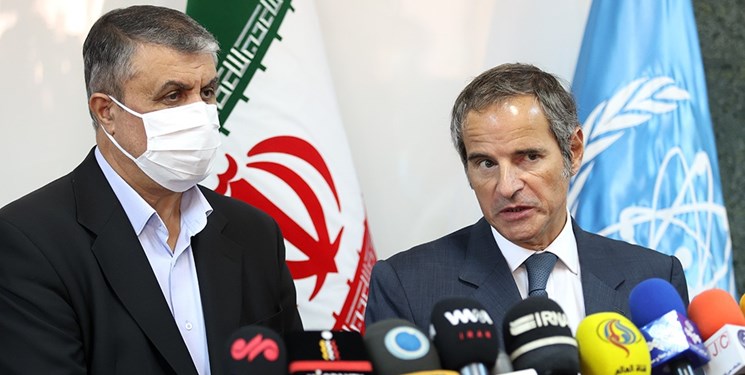Abed Akbari told the Strategic Council on Foreign Relations that the Director General of the IAEA emphasized after the recent session of the Executive Board of the IAEA in Vienna in connection with his visit to Tehran and meetings he held with new Iranian officials that the agency is keen on continuing constructive engagement with the Islamic Republic of Iran.
“Rafael Grossi said talks with President Raisi’s government is important for developing cooperation between Iran and the Agency and the settlement of the standing problems. He also requested that talks continue concerning keeping equipment required for the study and monitoring of Iran’s nuclear activities by the IAEA inspectors and the extension of memory cards for recording devices such as cameras and other issue of difference.”
Akbari pointed out that in recent days, there have been arguments about the possibility of adopting strict approaches to put pressure on the Islamic Republic of Iran to “return under pressure” to the negotiating table. He added that “despite the positive approach of the Iranian government to continue negotiations with the IAEA, it seems that in the new term of the IAEA management, for reasons such as pressure from the White House and the Zionist regime on this organization and submitting alleged documents against our country, the IAEA’s behavior towards Iran is not professional and technical and has taken a political side, which is a wrong and unconstructive approach.”
This international affairs expert said “it was with this approach that a few months before and before the meeting of the Board of Governors, for the first time since the signing of the JCPOA, the agency took a planned action and without any legal or technical justification, submitted a political and unwelcomed report on the Islamic Republic’s interaction with the agency. Following this report, the European Troika, in a scenario coordinated with the United States, presented a draft of an anti-Iranian resolution based on the alleged documents of the Zionist regime to the IAEA Board of Governors, in order to publish the first negative report on Iran’s activities under the JCPOA.”
He stressed that such behavior of the IAEA and its directors would definitely reduce Iran’s motivation to cooperate and would not be considered an interactive approach in any way.
According to this expert, the Islamic Republic of Iran has not forgotten that after the issue of UN Security Council Resolution 1737, despite its responsibility and duty, the IAEA refused to provide technical assistance to Iran in various projects, and thus, while using this assistance as a tool, the agency involved political and non-professional considerations in their presentation.
“This political approach to technical issues stemmed from the Security Council’s political decisions and calls into question its credibility, competence and impartiality,” Akbari stressed.
He pointed out that according to Article 3 of the IAEA Statute, “if this body encounters issues that fall within the competence of the Security Council, it will inform the Council as responsible for maintaining international peace and security.” He explained that none of the IAEA Director General’s reports described Iran’s nuclear activities as a threat to international peace and security. “Therefore, the referral of the case to the Security Council had no legal basis and was purely politically motivated.”
Akbari added that “according to the previous paragraph, the technical, professional and non-political view towards Iran’s nuclear program is not a choice, but a necessity. Achieving this will both attract more cooperation from Tehran and prove the independence and impartiality of the IAEA profession.”
“The necessity of this approach is doubled at a time when Iran, according to JCPOA and in response to the other side’s non-compliance, has reduced its obligations and despite the non-implementation of the Additional Protocol, adheres to the general requirements of the IAEA and the other side is trying to use the IAEA again as a tool to fabricate crisis.”










0 Comments